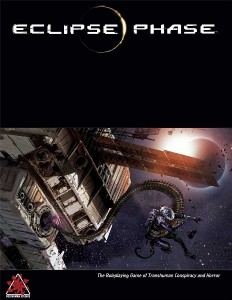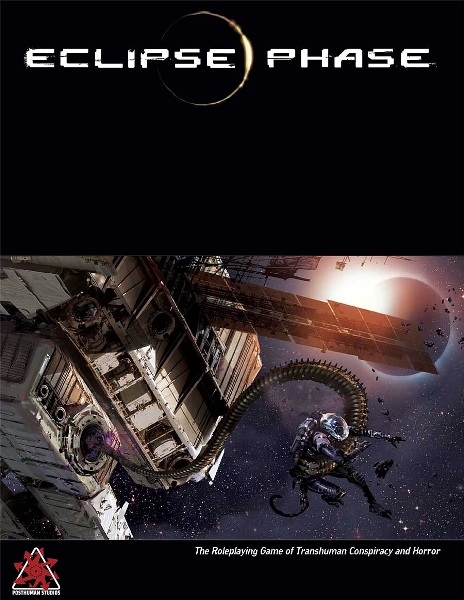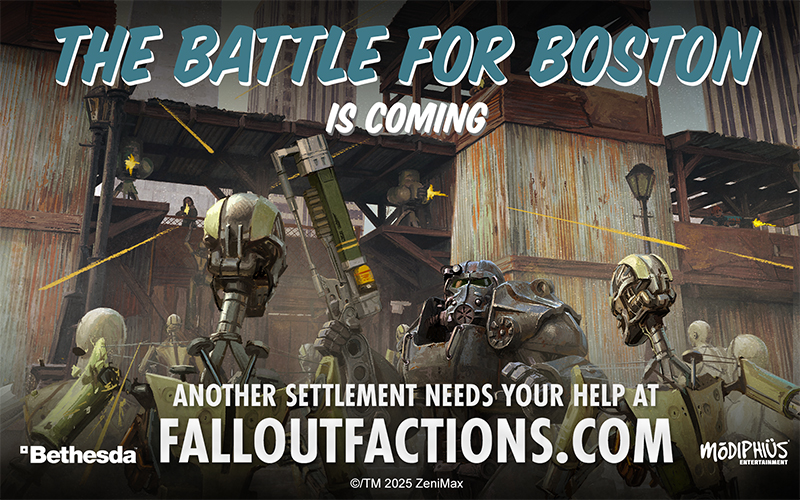
Eclipse Phase
Eclipse Phase is a complete sci-fi horror role-playing game, written by Lars Blumenstein, Rob Boyle, Brian Cross, Jack Graham, and John Snead and published by Posthuman Studios.
By Tyler Omichinski

Learn more about Eclipse Phase here
Purchase Eclipse Phase here
Find other Eclipse Phase posts here
Eclipse Phase, the gaming system and universe developed by PostHuman Studios is, essentially, “Transhumanism, the roleplaying game.” For those who are not familiar, transhumanism is the ideology that humans will soon use technology to evolve and become something more than what we currently are. Eclipse Phase has this in spades. It presents a world where your body is replaceable, skills can be purchased as software and death is regularly little more than an inconvenience. The result is something very different than your usual roleplaying experience: you can be an octopus uplifted to human-level intelligence in a robot body as part of an art exhibit on Mars, or you can be a former human engaged in a heady philosophical debate with a digitized version of yourself and be losing.
There has been an incredible level of detail, work, and vision put into the game system; which can be both a great opportunity and a heavy burden on gameplay. The sheer volume of detail and options makes it very easy for players and GM alike to be swamped. In an early play through of the game with my gaming group, players routinely found that they were unaware as to all the options that they had, resulting in gameplay screeching to a halt as someone reached for the book. Paying attention to all the moving parts, however, is extremely rewarding. The depth can be one of the most amazing parts of the game. In my experience, deciding which aspects of the game to set aside for your play sessions is rewarding.
The system works extremely well. It’s a d100 based system with some tweaks to it, like the capacity for players to critically succeed or critically fail. It also addresses one of the ongoing problems that I had experienced with Call of Cthulhu using the d100 system, namely how to determine who has succeeded in actions that are opposed. Eclipse Phase resolves this through a simple and easy to understand mechanic that keeps the speed of play going. There are also some interesting mechanics, in particular one called Moxie which allows players to either re-roll a dice, or switch the 10’s and 1’s digits on their d100, to assist players in ensuring that they have agency.
Ultimately, the system and the background materials present a wide swath of content and a flexible system that can serve whatever your gaming group wants; whether it is a space opera, exploring the universe in a Stargate-esque gatecrashing scenario, or even something relatively mundane like spying for hypercorporations in the future, Eclipse Phase has the mechanics and the tools for you to use. Where the game really shines, however, is wedding the mechanics and the mythos that is provided within the books. The Eclipse Phase canon blends Lovecraftian-esque mythos in the form of things that cannot be understood by mere humans with advanced, singularity level artificial intelligence. When memories can be hacked or altered, or weeks of your life can disappear with a computer glitch, Eclipse Phase shines. It also shines when it is handled in a mature manner, but it can definitely be used in any manner of different scenarios. Tackling major philosophical and existential horrors is where this game excels. To get a better idea of how this can be handled, I highly recommend picking up one of the free scenarios that have been posted online to see the cosmic horror that Eclipse Phase can realize.

